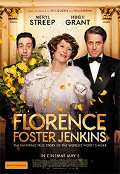
Directed by
Stephen Frears
110 minutes
Rated PG
Reviewed by
Chris Thompson

Florence Foster Jenkins
Synopsis: It's 1944, Florence Foster Jenkins (Meryl Streep) is an heiress, socialite and patron of the New York music scene . She also believes she is a talented opera singer. Her common-law husband and manager, St Clair Bayfield (Hugh Grant), an aging failed British actor, does his best to protect Florence from the truth and the beneficiaries of her philanthropy go along with her fantasy. But when she hires accompanist, Cosmé McMoon (Simon Helberg) and announces a concert at Carnegie Hall, it’s only a matter of time before she will be confronted with the fact that most people are laughing at her behind her back.There is a fine line running through this story. On one side is the cruelty of laughing at the delusions of a woman who so fervently wants her dream to be true that she remains oblivious to the deficit in talent that makes it simply impossible. And on the other side is the care and compassion in its telling that draws us in to the complexity of Florence’s character so that we empathise with her and, to some degree, wish that her dream could come true. Stephen Frears, well known for his skill in telling stories of complex women in films such as The Queen (2006) and Philomena (2013) manages the conflict in a way that doesn’t make us feel heartless when we find, as we often do, the humour to be really funny.
Frears is aided and abetted in this by Streep’s wonderful performance that gives us a Florence who is guileless and without ego or arrogance in her quest for the spotlight. She is driven, not by the desire for celebrity, but by her genuine love of music. Grant, too, is marvellous in his role, making the shift here from playing his typical boyish, foppish, clumsy love interest to a more solid, middle aged character who carries with him the sadness of knowing that he never reached the goals he had as an actor. Perhaps it is this that drives him to be so ferociously protective of Florence coercing and even bribing those around her to sustain the bubble in which she can truly believe in the glorious voice she hears in her head. In this respect, Streep, who’s shown us her singing chops in films like Mamma Mia! (2008) and Into The Woods (2014) is really convincing in her flat and tuneless renditions of some of the great operatic arias.
But the real surprise, for me at least, is Helberg as the nervy pianist who thinks he’s hit the big time until he actually hears Florence sing. His performance is so far away from the annoying character he plays in the hit sit-com Big Bang Theory as to be a revelation. The relationship between he and Florence is warm and heartfelt and goes a long way towards keeping the film on the right side of that fine line.
This is a fun, often funny, sometimes sad, wholly entertaining film with beautiful period art direction by Gareth Cousins and Christopher Wyatt and (Florence’s singing aside) a good soundtrack by the prolific Alexandre Desplat. Admittedly, it sinks into some gooey sentimentality at the end but, for most of the time, manages to keep its head well above the mawkish waterline.
By the way, the astute viewer will have noticed that this story is currently playing in another guise in Xavier Giannoli's Marguerite in which Florence has been re-cast as the title character and her story transplanted from 1940’s New York to 1920’s Paris. It’s well worth seeing both.

Want more about this film?


Want something different?




